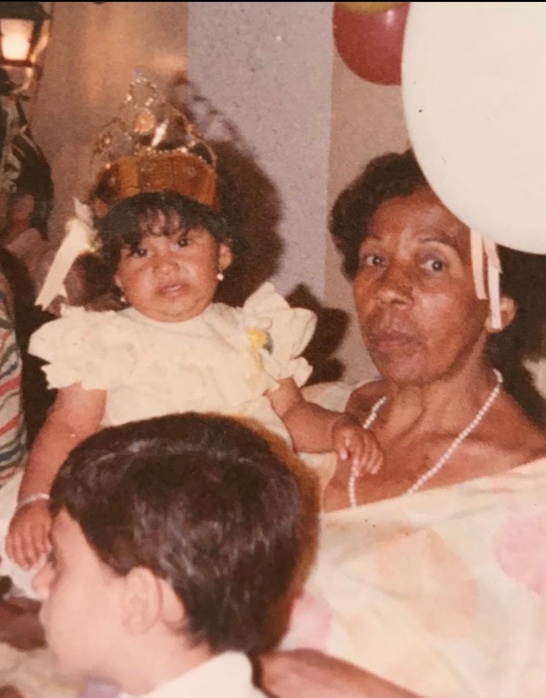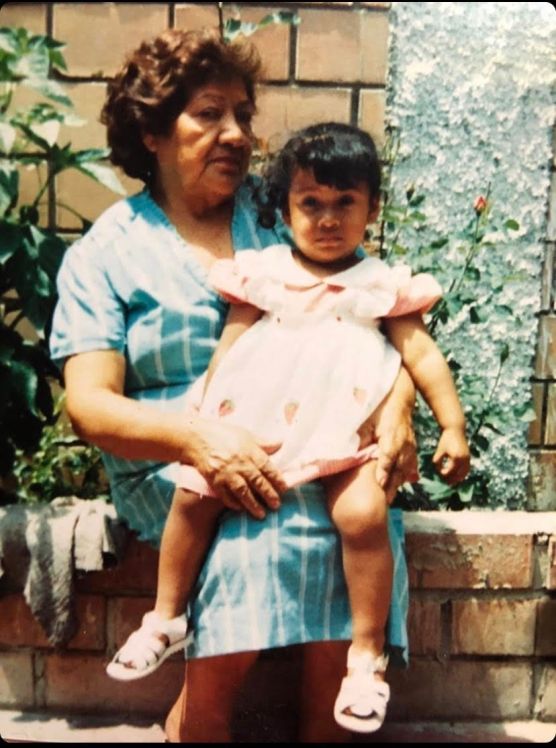Imagine being a product of two rich ethnic groups. Imagine being a descendant from Peru and standing proudly in your skin. Imagine being Vivian Moran.
Whose art recognizes her African and Indigenous roots and gives a voice to her community.
From celebrating Black and Indigenous womanhood through digital art. Or saying what needs to be said on the dope podcast.
Her narrative speaks volume and her story and strives to raise attentiveness will not be silenced.
Check out her interview and let’s start a conversation.

What does Afro-Indigenous mean to you?
Afro- indigenous means honoring both sides of my ancestors. On my mother’s side, her mother, My Nonna, was a black woman and she married an indigenous man from Cerro de Pasco Peru. I don’t know much of my father’s side but he is a black man with indigenous roots as well. His mom Mamita Rosa, is from Sihuas which is located in the Ancash Region of Peru.
When I claim the Afro-Indigenous identity, I’m doing it for them. their pride runs through me.



What does the term mean for individuals who may not be familiar?
Afro-Indigenous means to be both African and Indigenous ancestry. What your parents are and my parents are both Afro – Peruvian & Indigenous.
Have you ever struggled with your cultural identity? If so, how did you overcome those obstacles?
I definitely have. When I migrated to the USA, I was 4yrs old, I didn’t know any other Peruvians but my family and my father’s brother and their friends from the same neighborhood they grew up in Peru. We lived in South Jamaica, Queens, which is predominantly black. I didn’t see anyone who looked like me. People thought I was Mexican. I didn’t fit in with the white girls, my skin wasn’t light enough and my hair wasn’t straight enough. I didn’t fit in with the black girls because I spoke Spanish and my skin was too light. I learned English by reading, so I kept my head in the books a lot. As I got older, more ethnicities showed up but still no one that looked like me. What made it worse was having a light skin mother whom no one believed was my mother.
Whenever I met another Peruvian, I was always so excited to vibe with them and their families, but that wasn’t felt vice versa. Somehow Peruvians never liked me. I guess I remind them of their blackness and of the indigenous they try to forget. It took a lot of therapy to overcome that obstacle and soul searching. This cultural identity crisis is part of generational trauma that colonialism brainwashed our ancestors to believe and it’s up to me to break that. I don’t want my nieces growing up with that same feeling, I want them to be proud of their culture and the color of their skin.
How was growing up Peruvian and what are you most proud of?
Growing up Peruvian was definitely very different and unique. Some experiences were good and others not so nice. Obviously having no representation in the media and in daily life was hindering me from having a sense of belonging. So because of that, I leaned on my grandparents to teach me about our culture. I have a close connection with my grandparents. That’s actually one of the things I’m most proud of being Peruvian. We are taught to have such deep respect and connection with our elders. Everyone reading this is probably questioning why I didn’t say our food and music! Yes, we have amazing food and our music! Maaaan! Festejo comes from within our blood! But, that connection I have with my elders, they taught me to have that blanquirojo pride.
What is the biggest Afro-Indigenous influence that you incorporate into your daily lifestyle?
My spirituality! Los Incas believed in reincarnation, they praised the sun and the moon. I am the daughter of both the Sun and moon. When slaves were brought over from West Africa to Peru, they brought their Yoruba religion with them. One of the most common Yoruba traditional religious concepts has been the concept of Orisa. Orisa (also spelled Orisha or Orixa) are various godly forms that reflect one of the various manifestations or avatars of God in the Yoruba religious system. I believe in the Orishas. I have a close relationship with Eleggua. I make sure to honor my ancestors on my altar and Eleggua. I light their candles, change their waters weekly, I play their music, and make offerings to them. They do right by me, so I do right by them by honoring them in my daily life.
What is one misconception you have heard about your cultural identity and how did you handle that?
That Peruvians aren’t black! There’s hardly any representation for Black Peruvians in the media. I mean, we have Victoria Santa Cruz, Susana Baca and Eva Ayllon. Outside of them, there isn’t any other representation that depicts Black Peruvians in a positive light. Peru doesn’t talk much about the black culture unless these two women are singing about it. For a long time, I was told that I wasn’t black. My grandma denied her blackness until death. I can only imagine the experiences she had growing up black in Peru. I made it my business to educate myself about my lineage so I can educate others as well. I made sure to tell my grandma during her last days that she was a beautiful black woman, and that her skin color was beautiful too.
Peru was the first country to apologize for their abuse of African Descendants for so many decades. Do you feel like there has been improvement or space for Black Peruvians?
I’m not too sure about how Peru is doing to improve their treatment of Black Peruvians, but in all honesty, I feel like it’s a publicity stunt. I think they should put their money where their mouth is, REPARATIONS! A true apology would be for the government to do the work in the streets, in the communities that are predominately black. Create a better infrastructure for them to thrive. have a better curriculum in schools to teach Peruvian black history. Latin America was the main destination of millions of African people during the slave trade, 95 million slaves in Peru.
Apologies also start at home, some kids are being taught that the only way to levantar la raza is to marry white, to lighten the bloodline. Not only does that create prejudices in our own home but also teaches black and brown kids that our skin tone isn’t good enough, that our skin tones aren’t beautiful. Peru can create safer spaces by teaching in schools how racism, specifically towards black Peruvians and the indigenous, has hurt the country as a whole and how we as Peruanos can progress by not discriminating based on the color of our skin. We can’t enjoy Festejo, Lando, musica criolla, and still be racist towards Black Peruvians.
How do you use your platform to raise awareness about the Afro-Indigenous population?
I’m very opinionated when it comes to the injustices within the black community. I try my best to post and repost what the Black Lives Matter platform stands for. I post about the injustices the Indigenous people of Peru face and have faced. I talk a lot about racism within my own family and how it has affected the relationship I have with my family. I try my best to be very vocal about all those things. Even if I’m viewed as problematic within the Peruvian community, I feel that regardless of how I’m viewed, these topics have to be spoken about to break the generational trauma we carry from the experiences our ancestors faced. We can’t sweep things under the rug anymore for the sake of keeping the peace.
How do you incorporate your roots into your art? Has this helped you shape your identity?
I painted the images I wanted to see growing up. I have a huge admiration for black and indigenous women. They’re resilient as fuck! Painting resilient women have helped me gain more confidence in myself and my identity.

What was the creation behind Oye Mi Gente! podcast?
So, I have always been interested in journalism and radio broadcasting. I used to intern at Urban Latino Radio ( ULR) in Brooklyn. The experience was incredible and it stayed with me. Meeting my girlfriend put things into perspective for me. She’s a musician. I spoke to her about my experience at ULR and how much I miss it and she suggested starting the podcast. At first, it was a 3 person show, myself, my girlfriend, and an old high school mate of mine, it was supposed to be like a Latinx version of the breakfast club.
We started going through some creative differences, I was told that some viewers were complaining about the topics we spoke about sound anti-white. After that, it became just me and my girlfriend. We sat down and spoke about what I wanted out of this podcast and who I wanted to do this for. This podcast is for people who look like me, who look like my girlfriend, for all immigrants, and first-generation children of immigrants. For Afro – Latinos / Indigenous folks who don’t have representation in media and for my LGBTQIA community because without them I wouldn’t be me. I wanted to continue talking about hard topics that affect our communities. My girlfriend came up with the name. Oye Mi Gente! is a call to our people to come to join us because I got a lot of shit to say.


What would be your advice for someone wanting to start their own podcast?
To just start that shit! Don’t worry about views and who’s going to listen. Get organized with the topics you want to talk about. I also suggest listening to other podcasts so you can get a feel for how you want to direct yours. You learn as you go honestly. I think the hardest part is figuring out a name. Other than that, go for it, talk that shit! Just remember to stay consistent.
Keep up with Vivian by following her Instagram @blackflowersgrow and her podcast @oyemigentepodcast .
